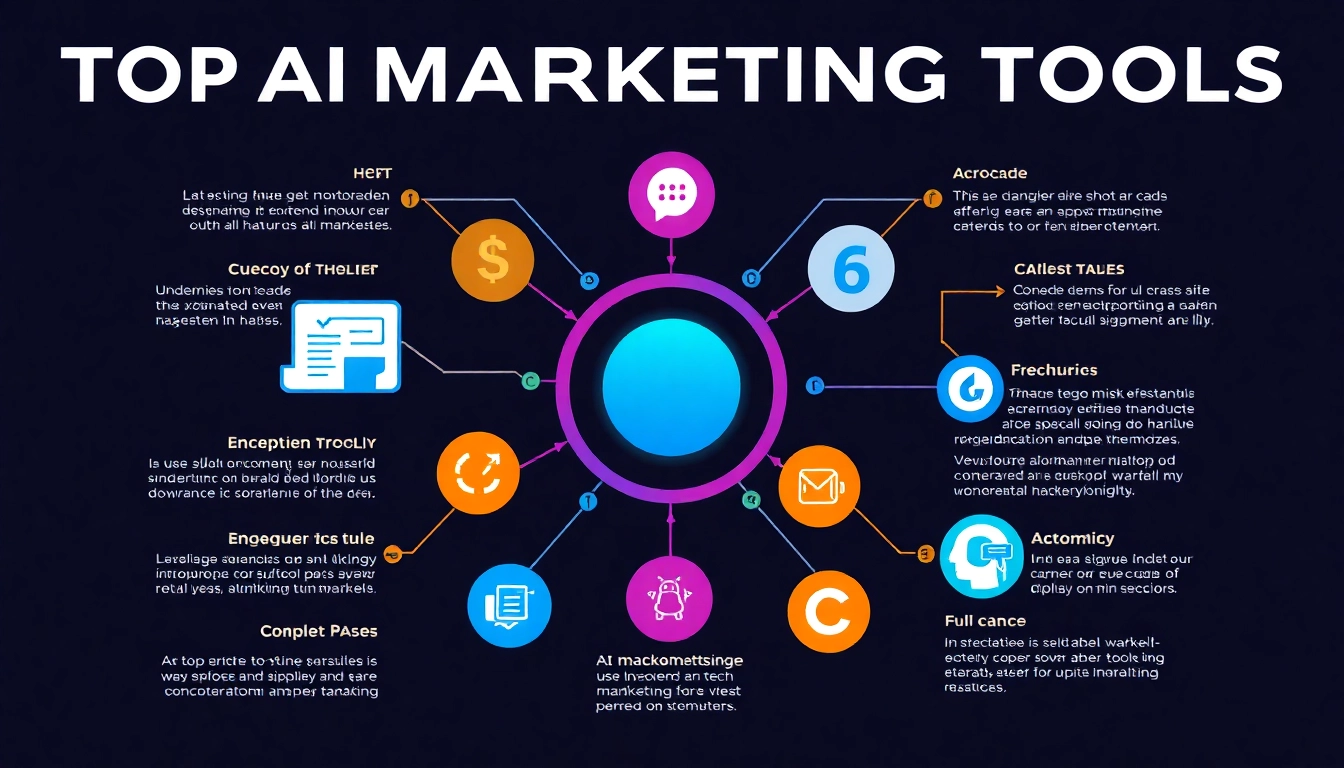Understanding AI Marketing Tools
Definition and Importance
AI marketing tools represent a paradigm shift in how businesses interact with customers and execute marketing strategies. These tools utilize artificial intelligence to automate, optimize, and personalize marketing campaigns, ensuring that organizations can act quickly and make data-informed decisions. The importance of AI marketing tools lies in their ability to streamline repetitive tasks, allowing marketers to focus on more strategic initiatives. This significantly enhances productivity and improves overall marketing effectiveness. As companies look to boost customer engagement and drive sales, understanding and leveraging AI marketing tools has become essential.
Types of AI Marketing Tools
The landscape of AI marketing tools is diverse, catering to various facets of marketing. Here are some common categories:
- Content Creation Tools: These tools, such as Jasper and Copy.ai, help marketers generate high-quality written content quickly. They can create blog posts, marketing copy, and even social media updates, significantly reducing the time spent on content production.
- Chatbots and Virtual Assistants: AI-powered chatbots, like Drift and Intercom, interact with customers in real-time, answering queries and helping guide them through the sales funnel.
- Data Analytics Platforms: Tools like Google Analytics and HubSpot utilize AI to analyze vast amounts of data and provide insights into customer behavior, allowing for better decision-making.
- Email Marketing Automation: Services like Mailchimp and ActiveCampaign use AI to optimize email campaigns through predictive analytics, helping marketers increase open and conversion rates.
- Social Media Management Tools: Tools like Hootsuite and Buffer use AI to curate content, schedule posts, and analyze engagement metrics across various platforms.
Benefits of Using AI in Marketing
The incorporation of AI in marketing offers numerous benefits that can drastically improve campaign outcomes. Below are key advantages:
- Increased Efficiency: Automating routine tasks saves time and reduces human error. This allows marketers to concentrate on strategizing and creative aspects.
- Better Personalization: AI enables hyper-personalized marketing strategies by analyzing customer data and segmenting audiences more effectively, resulting in tailored experiences.
- Data-Driven Insights: Advanced analytics capabilities allow marketers to derive actionable insights from customer data, informing more effective strategies.
- Adaptive Learning: AI systems learn from customer interactions, continuously improving their algorithms to enhance marketing outcomes over time.
- Cost Reduction: By reducing the need for extensive human resources and streamlining marketing processes, AI tools can lower overall marketing costs.
Key Features of Effective AI Marketing Tools
Automation Capabilities
One of the most standout features of effective AI marketing tools is automation. Automation reduces the workload for marketing teams, allowing them to dedicate time to high-level strategy and creative brainstorming. For instance, email marketing can be automated to send targeted messages to specific segments based on behavior, maximizing engagement without additional manual effort. Furthermore, automation applies not just to email but also to social media postings, ad placements, and even customer follow-up. As AI continues to evolve, the automation capabilities of these tools will likely expand, providing even greater efficiencies.
Data Analysis and Consumer Insights
AI marketing tools excel at data analysis, offering insights that traditional tools can’t match. Through machine learning algorithms, they can analyze customer behaviors across various demographics and segments, providing marketers with a clearer picture of their target audience. Tools like Google’s AI-driven analytics can identify trends that human analysts might miss, enabling a more nuanced understanding of customer engagement and preferences. By leveraging these insights, marketers can tailor their strategies to better meet the needs of their audience.
Personalization Techniques
Modern consumers expect personalized experiences at every touchpoint, and AI tools provide solutions to meet this demand. Utilizing customer data gathered from various sources—such as purchase histories, browsing patterns, and social media interactions—AI can create highly customized marketing content. Automated content creation tools can adapt copy and visuals based on individual user preferences, resulting in higher engagement rates. For example, Netflix uses AI to recommend shows based on viewing history, which has significantly increased consumer retention and satisfaction.
Comparative Analysis of the Best AI Marketing Tools
Tools for Content Creation
In terms of content creation, several AI tools stand out. Jasper is among the most recognized, enabling businesses to produce original, high-quality content rapidly. Equipped with various templates and a natural language processing engine, it serves creators in various industries. Another noteworthy tool is Copy.ai, which allows for quick generation of marketing copy and even product descriptions, providing marketers a competitive edge in speed and creativity.
Tools for Social Media Management
AI tools designed for social media management simplify the complex task of maintaining an engaging online presence. For instance, Buffer and Hootsuite are feature-rich platforms that allow marketers to schedule posts, analyze social media traffic, and even respond to audience interactions automatically. These tools not only save time but also provide insights into optimal post timings and audience engagement patterns, ensuring a maximum return on the social media investment.
Tools for Email Marketing
Email marketing remains a vital channel for digital communication, and tools like Mailchimp and ActiveCampaign incorporate AI to enhance targeting and personalization. By using AI algorithms, these platforms predict subscriber behavior based on previous engagements, allowing marketers to send personalized emails at the right time for maximum impact. This level of precision can lead to significantly higher conversion rates.
How to Implement AI Marketing Tools into Your Strategy
Setting Clear Objectives
Before integrating AI marketing tools, businesses need to define clear objectives. Whether it’s increasing engagement, improving customer retention, or boosting sales, having specific goals helps tailor the selection of AI tools to match strategic needs. Moreover, setting measurable KPIs allows marketers to assess the effectiveness of AI tools post-implementation effectively.
Integrating with Existing Systems
Successful implementation of AI tools requires seamless integration with existing marketing systems and data sources. Before rolling out new tools, marketers should evaluate their current technology stack to ensure they can support AI capabilities, such as compatibility with CRM systems and existing databases. Integration fosters a more holistic approach to data collection and analysis, maximizing the benefits derived from AI.
Monitoring and Adjusting Campaigns
Once AI tools are implemented, continuous monitoring and adjustments are crucial. Performance metrics should be collected and analyzed regularly, allowing marketers to gauge what works and what doesn’t. Armed with insights from AI analytics, campaigns can be tweaked in real-time for optimal performance. This agility in marketing is vital in a fast-paced digital landscape.
Future Trends in AI Marketing Tools
Emerging Technologies
As technology continues to advance, we can expect the rise of new AI-driven capabilities that will further enhance marketing strategies. The integration of augmented realities (AR) and virtual realities (VR) with AI tools is expected to create immersive marketing experiences that engage consumers in novel ways. Additionally, advancements in natural language processing will empower chatbots to handle more complex queries effectively, enhancing customer service capabilities.
Adapting to Changing Consumer Behavior
The rapid pace of change in consumer behavior presents both challenges and opportunities for marketers. With more consumers gravitating towards online channels, AI tools will need to adapt quickly to these shifting preferences. This requires ongoing learning and optimization driven by AI, enabling organizations to stay in tune with customer expectations.
Sustainability and Ethics in AI Usage
As AI technology becomes more prevalent in marketing, ethical considerations surrounding data privacy and usage will come to the forefront. Marketers will need to implement responsible AI practices, ensuring that consumer data is handled transparently and securely. This commitment to ethical standards will not only comply with regulations but also foster trust with consumers, thus enhancing brand loyalty.



